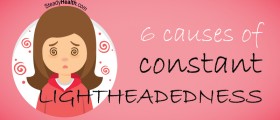
Introduction to dizziness
When a person is feeling dizzy, they are experiencing a sensation in which they feel as if their surroundings are spinning and they are about to lose their balance.
It can be classified into the two usual types, lightheadedness and vertigo.
When a person is lightheaded it is usually not a very serious problem, but if they feel like this all the time then it could be a serious problem after all.
It is important to essentially understand what the difference is between lightheadedness and vertigo in order to understand dizziness fully.
When a person is lightheaded, they feel like they are going to faint, but they do not experience any of the spinning symptoms.
It can also be accompanied with nausea and vomiting symptoms.
When vertigo is the problem, then the spinning is a prominent feature.
In the case of vertigo, the entire room begins to spin and a person is not able to stand or walk, losing his or her balance completely. Causes
There are many conditions and diseases that can cause dizziness.
One of the main causes of lightheadedness is a drop in blood pressure. This can be a serious problem if it is constantly occurring.
Many people feel dizzy when blood flow moves away from the head. This can happen when a person is lying down and then suddenly gets up and stands.
People who have a cold could also experience dizziness. However, it usually won’t be the only symptom, and other symptoms of the flu or cold include dehydration, diarrhea, vomiting and fever.
There are some over-the-counter drugs that can make a person feel lightheaded. Medicine for high blood pressure, respiratory problems, pain, or mental problems can all cause dizziness.
Allergies can also cause lightheadedness, as well as alcohol and drug abuse.
Bleeding is also another common cause, which is why many women report that they feel dizzy when they are on their menstrual periods.
One of the most common causes of vertigo is labyrinthitis, which is caused by an inflammation of the inner ear.
This is also usually accompanied by temporary hearing loss, nausea and vomiting as well, and the symptoms are usually very similar to those of a common cold or flu.
Damage or injury to the nerves that carry message from the ear to the brain can also cause vertigo.
One of the most common causes of vertigo is migraine headaches. Also, it can be caused by damage to the tiny stones that are located in the inner ear. When the stones move, the person often feels the effects of vertigo.

















Your thoughts on this
Loading...